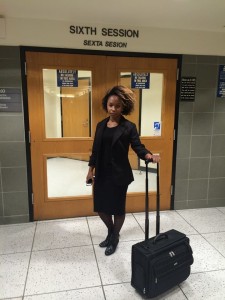Academic Program
Criminal Justice Institute: Defense Theory and Practice Open to 3Ls only
 This course seeks to examine the nature, functions, dynamics, and ethics of such tasks as interviewing, investigation, examination and cross-examination of witnesses, argument, and other aspects of criminal defense advocacy, both in and out of the courtroom. Students will also examine the theory and practice of defense advocacy for minors accused of delinquency, focusing on the constitutional framework of the juvenile justice system. Students will study the Massachusetts juvenile courts, examining the history and philosophy of a separate juvenile system, juvenile court jurisdiction, and the impact of various state agencies on the administration of justice in juvenile court. The class component will attempt to develop a variety of operational and ethical frameworks within which students can understand and evaluate their practice experience.
This course seeks to examine the nature, functions, dynamics, and ethics of such tasks as interviewing, investigation, examination and cross-examination of witnesses, argument, and other aspects of criminal defense advocacy, both in and out of the courtroom. Students will also examine the theory and practice of defense advocacy for minors accused of delinquency, focusing on the constitutional framework of the juvenile justice system. Students will study the Massachusetts juvenile courts, examining the history and philosophy of a separate juvenile system, juvenile court jurisdiction, and the impact of various state agencies on the administration of justice in juvenile court. The class component will attempt to develop a variety of operational and ethical frameworks within which students can understand and evaluate their practice experience.
Within the first weeks of class, students are assigned criminal and juvenile delinquency cases at arraignments in local district and juvenile courts under the Massachusetts student practice rule. Student attorneys engage in every stage of client representation from arraignment through trial, including client interviewing, factual and legal investigation, motions practice, developing case theories, and preparing and conducting witness examinations and argument. They may also provide representation to minors in school disciplinary hearings or represent adult clients in appellate or other post-conviction legal proceedings. In addition, students work with CJI’s social worker to provide comprehensive representation to adult and juvenile clients.
Students are responsible for providing complete legal representation to their clients during the course of the term and are expected to work a minimum of twenty hours per week at the Criminal Justice Institute under the supervision of a clinical instructor at the Institute. Students receive one-to-one supervision, individual critique of their courtroom work, and participate in regular group sessions with their supervisor.
Classroom reading and discussion draws upon and complements the students’ experiences as defense counsel. The teaching method includes exercises and discussions on the Code of Professional Responsibility and the Model Rules of Professional Responsibility. Students become familiar with the Fourth, Fifth, Sixth, and Fourteenth Amendment rights of both adults and juveniles accused of delinquency, as well as the law of evidence and sentencing. There is a review of essential lawyering skills in criminal practice.
The nationally-known Trial Advocacy Workshop (TAW), directed by Professor Charles J. Ogletree, Jr. and Professor Ronald S. Sullivan Jr., is a prerequisite for CJI: Defense Theory and Practice. The workshop is an intensive three-week trial advocacy program culminating in a full simulated trial with high school or law students serving as jurors. TAW students are instructed and critiqued by a faculty of experienced lawyers and judges.
Please note that the CJI: Defense Theory and Practice course includes a professional responsibility component and satisfies the professional responsibility graduation requirement. Students may not enroll in more than one course that fulfills the professional responsibility requirement. Enrollment for this course is through the Office of Clinical and Pro Bono Programs only.
The following course offers placement opportunities at CJI: